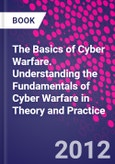The Basics of Cyber Warfare provides readers with fundamental knowledge of cyber war in both theoretical and practical aspects. This book explores the principles of cyber warfare, including military and cyber doctrine, social engineering, and offensive and defensive tools, tactics and procedures, including computer network exploitation (CNE), attack (CNA) and defense (CND).
Readers learn the basics of how to defend against espionage, hacking, insider threats, state-sponsored attacks, and non-state actors (such as organized criminals and terrorists). Finally, the book looks ahead to emerging aspects of cyber security technology and trends, including cloud computing, mobile devices, biometrics and nanotechnology.
The Basics of Cyber Warfare gives readers a concise overview of these threats and outlines the ethics, laws and consequences of cyber warfare. It is a valuable resource for policy makers, CEOs and CIOs, penetration testers, security administrators, and students and instructors in information security.
Please Note: This is an On Demand product, delivery may take up to 11 working days after payment has been received.
Table of Contents
Introduction
Threatscape
Military Doctrine
Cyber Doctrine
Tools and Techniques
Offensive Tactics and Procedures
Psychological Weapons / Social Engineering
Defensive Tactics and Procedures
Challenges We Face
The Future of Technology and Impacts on Cyber Warfare








